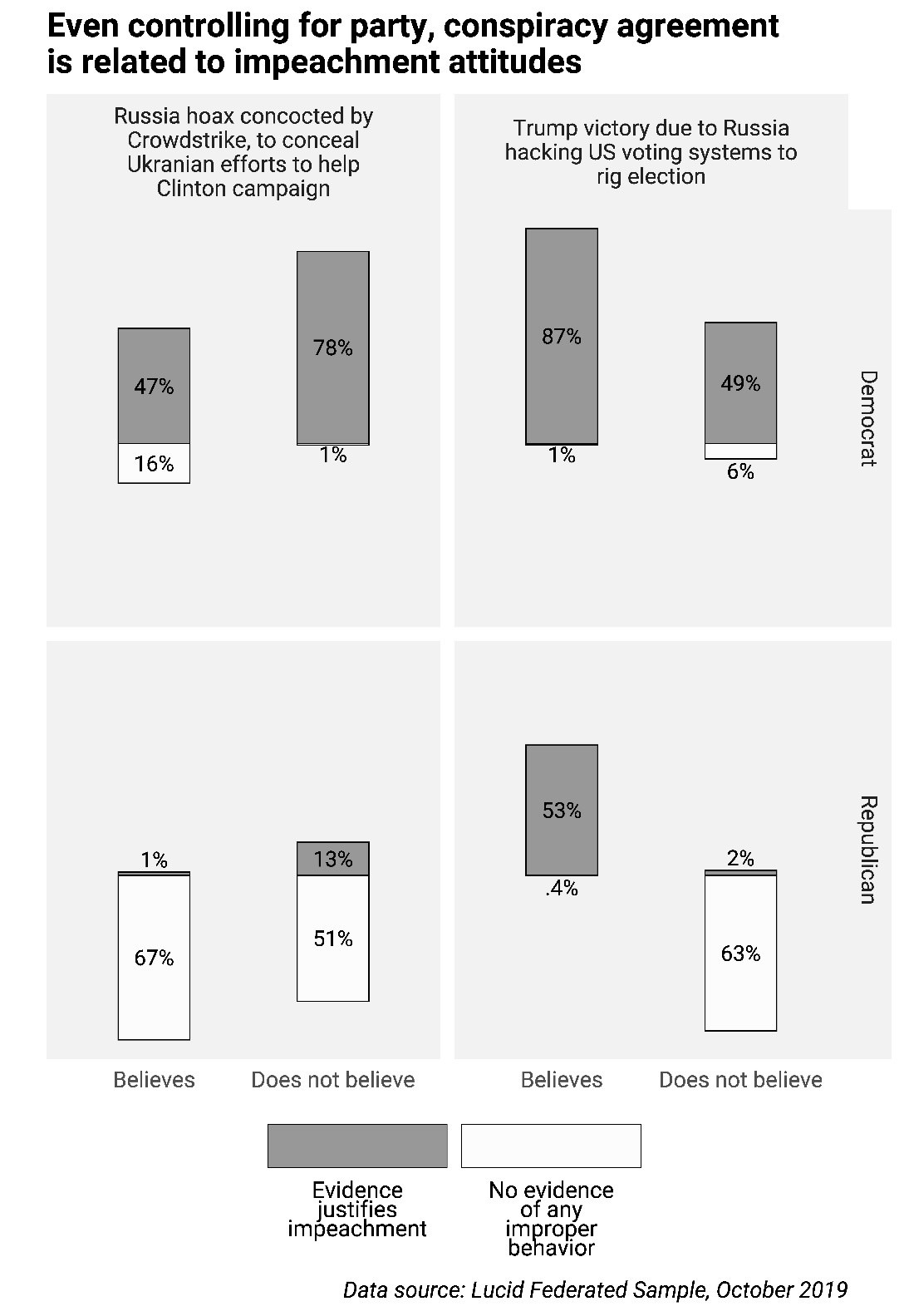The impeachment inquiry into President Trump is rife with conspiracy theories. It began, in part, with Trump’s demand that the Ukrainians investigate the “CrowdStrike” conspiracy theory, the false idea that Ukraine has the Democratic server that was hacked in 2016. Then came numerous conspiracy theories about congressional witnesses, George Soros and other usual suspects such as Russia or the “Deep State.”
Now, new polling that we’ve conducted shows just how much belief in conspiracy theories is connected to views of impeachment. And it’s not necessarily the CrowdStrike theory that has the strongest connection.
Between Oct. 24 and Nov. 4, we fielded an online survey of 1,206 American adults. The survey respondents were provided by Lucid and were weighted to approximate a nationally representative sample.
At the beginning of the survey, we posed the following question on impeachment:
The largest group (35 percent) said there is enough evidence to merit impeachment. An additional 14 percent agreed there is enough evidence for further inquiry. By contrast, 16 percent of Americans said Trump acted improperly but is not impeachable. Twenty-four percent said Trump did nothing wrong. Eleven percent said they didn’t know what to believe.
As other surveys have found, opinions are polarized along party lines. Sixty-nine percent of Democrats support outright impeachment, while only 5 percent of Republicans do. Meanwhile, 57 percent of Republicans think Trump did nothing wrong, compared with 2 percent of Democrats. Independents are more evenly divided, with 45 percent supporting impeachment or further inquiry, 41 percent preferring censure or exoneration, and 14 percent having no opinion.

But beyond partisanship, a second factor is related to impeachment opinions: support for conspiracy theories about the 2016 election.
In the same survey, we also asked two questions that posed a choice between a popular conspiracy theory, the official explanation, or neither option. The first question regarded Russian meddling in 2016:
Here, a majority pick the official explanation (56 percent), while 29 percent endorsed the conspiracy theory and 15 percent chose neither.
The second was a version of the “CrowdStrike” conspiracy theory that Trump himself asked the Ukrainians to investigate. Most respondents (63 percent) chose the first option, while 26 percent endorsed the CrowdStrike conspiracy theory.
Impeachment views are strongly related to beliefs in these conspiracy theories. Among the 29 percent of Americans who believe Russia rigged the 2016 election, a whopping 80 percent believe Trump should be impeached and 11 percent think he should be investigated further. Almost no one in this group thinks Trump did nothing wrong.
By contrast, among the 26 percent of Americans who believe the “CrowdStrike” conspiracy theory, nearly 50 percent think Trump did nothing wrong and an additional 25 percent believe he was wrong but that the act was not an impeachable one.
Obviously, these results are influenced partly by partisanship: 52 percent of Democrats believe in the Russia conspiracy theory, compared with only 4 percent of Republicans; meanwhile, 51 percent of Republicans believe in the CrowdStrike conspiracy theory, compared with only 9 percent of Democrats.
But even if we take partisanship into account, people who believe in these conspiracy theories still have distinctive views of impeachment. For example, among Democrats who believe in the Russia conspiracy theory, 87 percent support outright impeachment; among Democrats who don’t believe, only 49 percent support impeachment.
For Republicans who believe in CrowdStrike, 67 percent think Trump did nothing wrong compared to 51 percent of Republicans who don’t believe in CrowdStrike.

Why are these conspiracy theories related to people’s views of impeachment? In our past research, we argue that conspiracy theories tap into another force that organizes American politics: people’s intuitions. Conspiracy theories are popular because they draw on the innate ways we make judgments and rationalize our biases.
For people who find Trump an unacceptable president, the Russian hacking conspiracy offers a compelling way to justify their feelings. Conversely, for Americans who see Trump as their champion, the CrowdStrike conspiracy is a bulwark against inconvenient evidence of Russian influence on Trump’s behavior.
This provides another reason the impeachment hearings have had little impact on public opinion about impeachment or Trump himself. Most Americans have an ample supply of intuitions and gut feelings that only buttress how they already feel about Trump. New evidence about Trump’s behavior, or misbehavior, is unlikely to have much sway.
Eric Oliver is a professor of political science at the University of Chicago.
Thomas Wood is an assistant professor of political science at Ohio State University.
They are co-authors of “Enchanted America: How Intuition and Reason Divide Our Politics” (University of Chicago Press, 2018).



